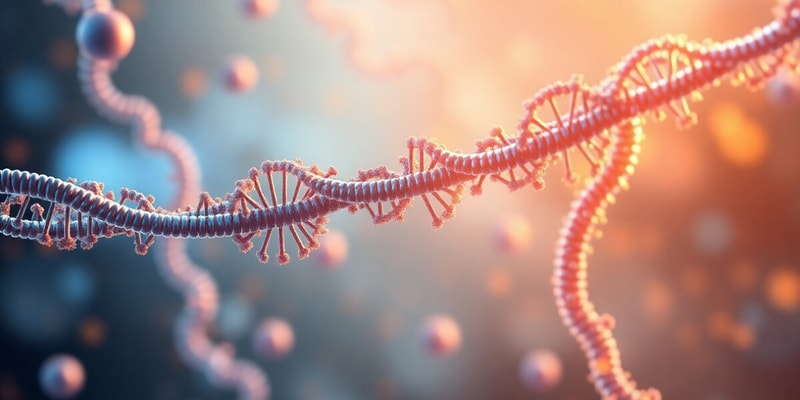Podcast
Questions and Answers
What is the earliest stage of cell differentiation called?
What is the earliest stage of cell differentiation called?
Which of the following best describes the process of differentiation?
Which of the following best describes the process of differentiation?
What is a major difference between embryonic stem cells (ESCs) and adult stem cells (ASCs)?
What is a major difference between embryonic stem cells (ESCs) and adult stem cells (ASCs)?
What is the primary factor that regulates changes in cell fate?
What is the primary factor that regulates changes in cell fate?
Signup and view all the answers
Which methodology is used to monitor the directed differentiation of embryonic stem cells?
Which methodology is used to monitor the directed differentiation of embryonic stem cells?
Signup and view all the answers
What does cell plasticity refer to in adult stem cells?
What does cell plasticity refer to in adult stem cells?
Signup and view all the answers
Which of the following best describes the role of the niche in adult stem cells?
Which of the following best describes the role of the niche in adult stem cells?
Signup and view all the answers
What characterizes the stable terminal state in cell differentiation?
What characterizes the stable terminal state in cell differentiation?
Signup and view all the answers
What aspect of cells differs throughout the life of an organism?
What aspect of cells differs throughout the life of an organism?
Signup and view all the answers
How can gene activity in differentiated cells be altered?
How can gene activity in differentiated cells be altered?
Signup and view all the answers
What is a primary factor that influences the fate of a group of cells?
What is a primary factor that influences the fate of a group of cells?
Signup and view all the answers
What is the role of morphogens in cell differentiation?
What is the role of morphogens in cell differentiation?
Signup and view all the answers
Which of the following molecules is likely to act as an inducer in cell signaling pathways?
Which of the following molecules is likely to act as an inducer in cell signaling pathways?
Signup and view all the answers
What helps in determining the differential expression of proteins between different types of human tissues?
What helps in determining the differential expression of proteins between different types of human tissues?
Signup and view all the answers
Which factor is NOT commonly associated with the regulation of cell fate?
Which factor is NOT commonly associated with the regulation of cell fate?
Signup and view all the answers
What is a key feature of the signal mechanisms in cell differentiation?
What is a key feature of the signal mechanisms in cell differentiation?
Signup and view all the answers
What role do master regulatory genes play in cell differentiation?
What role do master regulatory genes play in cell differentiation?
Signup and view all the answers
How does epigenetics contribute to cell differentiation?
How does epigenetics contribute to cell differentiation?
Signup and view all the answers
Which of the following best describes combinatorial gene control?
Which of the following best describes combinatorial gene control?
Signup and view all the answers
What is the primary function of the Notch signaling pathway in cell differentiation?
What is the primary function of the Notch signaling pathway in cell differentiation?
Signup and view all the answers
Which process allows organisms to adapt their behavior to the day-night cycle?
Which process allows organisms to adapt their behavior to the day-night cycle?
Signup and view all the answers
Positive feedback loops are essential for which aspect of cell memory?
Positive feedback loops are essential for which aspect of cell memory?
Signup and view all the answers
What makes epigenetic changes heritable?
What makes epigenetic changes heritable?
Signup and view all the answers
Which of the following represents an example of lateral inhibition?
Which of the following represents an example of lateral inhibition?
Signup and view all the answers
Study Notes
Lateral Inhibition
- Cells communicate with each other to ensure that only one cell adopts a particular fate.
- This process is mediated by the Notch pathway.
- The Notch pathway uses ligands such as Delta-like and Jagged in mammals and Delta and Serrate in Drosophila.
Cell Memory
- Cells use selective gene expression to remember what type of cell they are.
- Positive feedback loops support master gene regulation.
- Combinatorial gene control allows for the generation of many cell types during development.
- Repressive cycles, like circadian rhythms, utilize repressors.
- Epigenetics regulates heritable changes in gene expression without altering DNA sequence.
Master Regulatory Genes
- Master regulatory genes control the development of entire organs. Examples include:
- Toy (twin of eyeless)
- ey (eyeless)
- sine oculis (SO)
- eyes absent (eya)
- dachshund gene (dac)
Combinatorial Gene Control
- Combining a few regulatory proteins can generate many different cell types.
- The production of each regulatory protein is self-perpetuating, promoting cell memory.
Repressive Cycles (Circadian Rhythms)
- Circadian rhythms allow organisms to synchronize with day and night cycles.
- The circadian clock functions through a series of repressors.
Epigenetics
- Epigenetics allows for heritable changes in gene expression without altering DNA sequence.
- It relies on modifications to histones and DNA, as well as RNA regulation.
Physical Diversity
- Cells differ in:
- Number of divisions
- Repair capacity
- Maturity timing
- Number and type of changes throughout life
Gene Expression
- Experiments demonstrate that DNA is not lost or changed during developmental decisions.
- Gene activity can be changed by fusion of different cell types.
Fate Decisions
- Cell fate decisions are influenced by the environment.
- DNA remains unchanged during cell fate decisions.
- Cell fate involves either differentiation (change) or memory (maintenance).
- The molecular processes controlling these events are not fully understood but relate to protein differences.
- Different tissues have distinct protein profiles.
Position Influences Fate
- One group of cells can influence the fate of another group.
- This communication occurs through:
- Secreted diffusible molecules (inducers)
- Surface molecule receptors
- Gap junctions
- Signals are typically limited in time and space.
Common Inducer Molecules
- Various signaling pathways use specific ligands, receptors, and inhibitors:
- RTK (Receptor Tyrosine Kinase): EGF (Epidermal Growth Factor), EGFR (Epidermal Growth Factor Receptor), Argos
- S/TKR (Serine/Threonine Kinase Receptor): TGF-beta (Transforming Growth Factor beta), TGR-betaR (TGF-beta Receptor), Chordin, Noggin, BMP (Bone Morphogenetic Protein), BMPR (BMP Receptor), Nodal
- Wnt: Wnt (Wingless), Frizzled, Dkf, Cerberus
- Hedgehog: Hedgehog, Ptc (Patched), Smth (Smoothed)
- Notch: Delta, Notch, Fringe
Morphogens
- Morphogens are long-range inducers that exert graded effects.
- Their concentration varies, resulting in different fates based on threshold concentrations.
- Morphogens are negatively regulated by inhibitors.
Cell Fate Definitions
- Cell fate refers to what cells should become.
- It involves a commitment to a specific cell type with distinct identities and functions.
- Cell differentiation leads to stable terminal states.
- It involves changes in gene expression to produce specific proteins and is characterized by the cell's protein profile.
- Cell determination is the earliest stage of cell differentiation, where a cell is committed to a subset of fates.
- Some specified cells retain their fate even when isolated.
- Transplantation experiments demonstrate that some cells change their fate.
- Cell fate is regulated by a combination of intrinsic factors and external cues.
- Cell fate decisions dictate development throughout life.
Regulating Cell Change and Memory
- Change, or differentiation, refers to the process by which embryonic cells acquire distinct identities and functions.
- Cell memory refers to the stable maintenance of a cell's identity and function.
- It involves the emergence of specialized cell types, such as muscle, nerve, skin, and fat cells.
- Cell differentiation culminates in a stable terminal state.
- It involves changes in gene expression to produce specific proteins.
Directed Differentiation
- The ability to direct the differentiation of cells can be used for regenerative medicine and disease research.
- Stem cell research encompasses investigations of both embryonic stem cells and adult stem cells.
- The study of stem cells provides insights into the molecular mechanisms of cell fate decisions and their potential for therapeutic applications.
Studying That Suits You
Use AI to generate personalized quizzes and flashcards to suit your learning preferences.
Related Documents
Description
Explore the essential concepts of lateral inhibition and cell memory in developmental biology. This quiz delves into the roles of master regulatory genes and combinatorial gene control in cell differentiation and organ development. Test your understanding of gene expression and the Notch signaling pathway.



